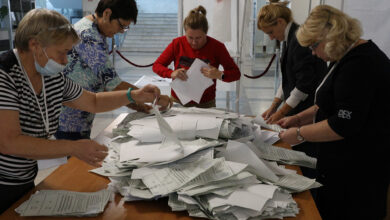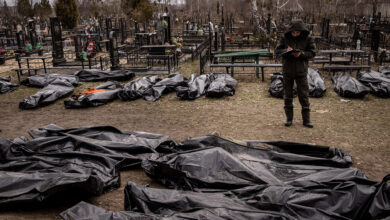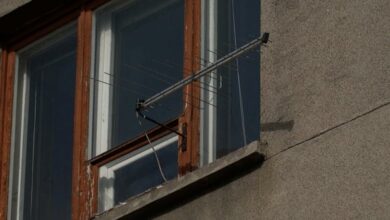One day ahead of the much-anticipated referendum on constitutional amendments, Islamists seized Friday's prayers in mosques across Egypt to mobilize voters to endorse the changes.
As soon as congregational prayers were concluded, a bearded worshipper in a brown gown stood up and addressed nearly 200 Muslims in a mosque in a rural neighborhood of Helwan Governorate, south of Cairo.
The man, in his 30s, asked the worshippers to vote in favor of the constitutional modifications.
He contended that a “yes” vote was a religious obligation, calling on voters to toe the line of Muslim authorities who have already endorsed the changes, including famous Salafi preachers Mohamed Hassan and Mohamed Abdel Maksoud and the Muslim Brotherhood.
In the meantime, a handful of children lined up outside the mosque distributed Muslim-Brotherhood signed leaflets reading "Yes to the amendments".
The flyer, void of any religious slogans, listed the edited amendments verbatim, elaborating on their advantages.
Different Islamic groups have fully endorsed the proposed changes including the Muslim Brotherhood, al-Jama'a al-Islamiya and various Salafi groups.
In the more affluent suburb of Heliopolis, a Friday preacher told the congregation that it is a “religious duty” to vote in favor of the eight constitutional amendments, one of which will limit the presidential terms to two four-year periods.
“Those who advocate voting for ‘no’ are but American stooges,” the preacher told the worshippers in the densely occupied mosque. It was not clear if the preacher is affiliated with the Muslim Brotherhood or appointed by the Endowment Ministry.
The official Al-Azhar institute has also called for Egyptians to vote “yes” in the referendum.
In the coastal city of Alexandria, media reports said that scores of Muslim Brotherhood campaigners prevented liberal activists from hanging posters on walls against the amendments. Many activists believe the constitution should be rewritten, not adjusted.
The Muslim Brotherhood's official website accused those who are encouraging votes against the amendment of receiving American funding and deceiving the public.
The Brotherhood posted an article on its site Ikhwan Online titled "A suspicious campaign to encourage rejection of the amendments."
Ikhwan Online removed the article after a slew of comments against it rejected the accusations of disloyalty, deception, and the acceptance of foreign funding. The article, which was only online for 1.5 hours, drew comments from 37 readers. The majority of the readers critiqued the Brotherhood for using the National Democratic Party’s tactics of accusing its opponents of disloyalty and lodging other unfair accusations against them.
Former President Hosni Mubarak's National Democratic Party adopted the same stance as the Islamist groups. In Basateen, a lower-middle class area in western Cairo, witnesses said that NDP campaigners have distributed cooking oil bottles and flour packages to residents, asking them to vote in favor of the amendments.
Yet, most secular opposition movements, including the Coalition of Revolution Youths and the pro-ElBaradei National Association for Change called for a “no” vote, holding that the old constitution should be done away with and a new one drafted.
Political analysts said that the Supreme Council of the Armed Forces (SCAF) should have warned against religious mobilization in mosques since it banned media mobilization.
"I think that the SCAF should have issued a warning against any political party or force to mobilize people on the streets using any form of incentives, just like it prevented the media from publishing any opinion on the referendum ahead of the voting," said Hala Mostafa, chief editor of Al-Ahram’s Democracy Journal.
A "yes" vote for Mostafa means the perpetuation of old practices, which took place under a dictatorship and will extend under an emerging democracy. "The passing of those amendments will show how the upcoming elections will be influenced by capital and those who have traditionally groomed authority in their constituencies. This has to change for democracy to be genuine."
The military issued a warning on Tuesday banning media outlets of publishing materials that could influence voters’ decisions.
With the exception of state-run media, the majority of privately-owned media advocated a “no” vote, suggesting that the 25 January Revolution called for a new democratic constitution, not merely cosmetic changes to the 1971 constitution, which bestows overwhelming powers to the president.




